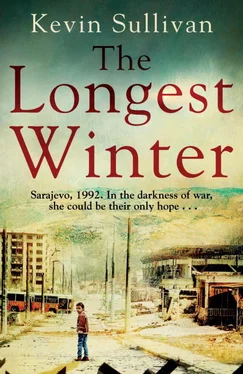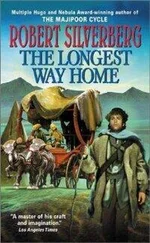She kept on walking. She felt foolish wearing these boots. Probably no one had noticed them when she and Nina had been at the concert. But she would have hated to have embarrassed the little girl.
And the child had sung so beautifully. Milena could have accompanied her on the piano. She imagined Nina in the city-centre apartment with the grand piano and the books and the long sofa. She saw her standing in front of the picture of the old market, where the wizened men in puttees walked towards the artist. Nina standing straight, with a blue dress on, a white lace border round the neck and cuffs, singing earnestly.
Milena knew how to accompany a song in a way that carried the singer’s voice, elevated it, danced with it. She imagined the notes melding with Nina’s voice and making something infinitely beautiful and pure in that beautiful room, something Nina would remember when she was old like Mrs Nurudinović and Mrs Hatibović.
Some kinds of beauty are immutable. They cannot be destroyed by cruelty or stupidity or violence, or even death. They inhabit the soul. They are the breath of God.
Milena felt a river of weariness run through her. She didn’t have the heart to walk further, all the way to the centre of town.
She wanted her father. She wanted to see him, walking towards her on this city street.
When Milena was a child she dreamed of her father. She could not speak about him, because her mother never spoke about him and Milena knew her father had been wicked to leave. Her mother had to fend for the two of them all alone.
But she dreamed of him. Milena dreamed of sitting on her father’s knee and whispering to him. She dreamed of leaning up so close she could feel the coolness of his skin, and almost touch the bristles on his cheek and she whispered to him.
‘Daddy.’
She would have given everything she ever owned to hug her father. She knew that he must have been lonely when he went away. He went off on his own to the city, leaving everything behind. He must have thought about Milena sometimes.
She wanted her father to walk towards her on this tree-lined street. He might have walked through this place once. He must have walked here once. It was the oldest road into the city, the path that was taken by every boy and girl and man and woman who fled here, or who came to seek their fortune, or who came to build an ordinary life. Her father must have walked along this street beneath these trees when he ran away from Foča. He must have walked here, with his heart beating, a poor man from the countryside all on his own. The way he spoke would have given him away, where he was from.
Milena had stopped thinking about the noise all around her. She was no longer scared, but she was immensely tired. She didn’t keep to the inside of the pavement or hug the barrier at the intersection before the bakery.
She wanted her father. Once, when she was about fourteen, Milena was betrayed by a boyfriend, Srečko. She learned about this not by being told but by being confronted with the evidence – Srečko walking hand in hand with another girl, on the road from the school to the city centre. Milena began to cry, quite suddenly and uncontrollably. And because she was embarrassed by her tears she walked quickly into a side street, hoping that no one would recognise her. She walked to the end of the street and tried to get her feelings under control. At the end of the street was an orchard that stretched to the edge of the river. Milena walked along the river bank out of the town and when she was tired and the path petered out, she sat on a rock and looked into the river. She imagined that if she jumped in at this point, where it was deep and slow moving, she could lie face down and the water would roll over her gently and she would go slowly down to the muddy river bed and open her eyes to look at the plants there, the plankton and weed, and she would grasp the soft earth in her fingers and lay her face on shells and stones. She would stay in the clear water and look at the fishes swimming from Foča all the way through rapids and waterfalls to the sea.
When she travelled to the sea with her mother, when she was very small, Milena nursed a secret wish that her father would be waiting for them at the coast. At the bus station, when her mother went to make a telephone call, Milena willed herself to believe that her father was going to come and collect them. It would be a surprise that they had prepared together, a surprise for Milena, and then the three of them would go to the sea together.
Every visitor who ever came to Željko and Jasna’s house and heard Milena play the German piano told her she had a gift. The music teacher at school told her she had a gift – so it must have been true, because the music teacher didn’t normally lavish praise on her pupils, and Milena, an otherwise unremarkable student who was inclined to be part of an unruly crowd, was not a likely recipient of the music teacher’s approval.
Playing the piano was what she was known for. That and the fact that her mother and father ran away.
Milena spent her life not turning her gift for music into a way of living with loss. She did not use music to reflect the bleak reality inside her heart. She learned how to undermine the strength of any tune, with subtle changes of chord and clever phrasing, to keep the listener off balance and surprised. She learned the tricks of the piano player’s trade. She never played the music in her soul. To do that would have been to recognise the meanness of fate.
She did her bar work like that, never going below the surface pleasantness. It made her good at what she did. She knew endless ways to ease a conversation into the comfortable byways of acquaintance and sometimes friendship. Over the years she had perfected her craft, until she could navigate a company with the greatest of skill. She was a master of her craft. Even when shells exploded outside she didn’t forget to count the change, and say please and thank you.
She feared that that was how she conducted her affair with Jusuf. Perhaps it was ruthlessly superficial. Perhaps she had devoted her huge energy over all those years, her vast reserve of hope and love, to the business of being with others without ever showing what was deep inside her. Her father left before she was born, and then her mother ran away, and let Milena come home from school one day to find strangers.
Or perhaps she was cheerful and hopeful and fun to be with because she resolved never to be mean. Perhaps she lived her life in anticipation of healing that wound. She could have left Foča when she finished school. But if she’d gone away, perhaps they would not have been able to find her, her mother and father, when they came back to be with her.
Or perhaps she should have come here sooner. Perhaps she should have come to look for them.
Because all those years her father did not know and her mother did not know what a beautiful woman she had become. She did what they were unable to do. She made her way in the world; she paid her debts and fended for herself, and if she had had children she would have loved them so.
The touch of her hand would have been upon her daughter’s hair. She would have sung to her.
The shells came in thick and fast now, and there were thunderflashes and fires; there was a sound as that of the sky torn.
Milena could feel the touch of her mother’s fingertips. She saw her mother’s face and knew that she was tired, infinitely tired from a lifetime of disappointment, and she reached up and touched her mother and held her close. If they had been like others and they had had time to play together and go to the sea and sit and look at the waves, she could not have loved her mother more. Because her love was infinite.
She came to this place to meet her mother and her father. She was drawn here, as they were drawn here. Like them, she spoke with a country accent that marked her out. But this place was where her husband first looked at her, where her father fled, where her mother joined him.
Читать дальше












